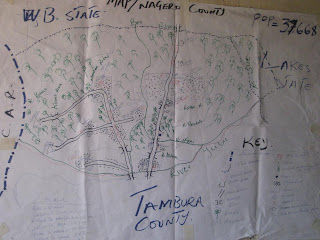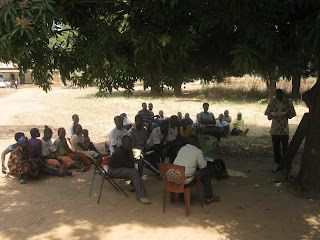As you may have gathered from my previous post, Tambura is quite rural and difficult to get around due to poor roads. For example, see below, on our way to one of the clinics--the bridge is, uh, not functional. As in, primarily composed of gaping, Land Rover eating holes. And yes, yes, that IS a rosary hanging from the rearview mirror. I believe it came in handy at several points on the trip.
Fortunately, we had a couple of excellent maps to guide our way.
The remote nature of Tambura means that, like many other places in Africa, my arrival into town does not go unnoticed. This is partly because visitors are limited enough to start with, but the blinding white nature of my skin tips most people over the edge on the intrigue scale. In particular, small children are regularly intrigued--and by intrigued, I mean terrified--enough of me and my abnormally pale skin that they actually burst into tears.
Occasionally my arrival sends small children scurrying off into the distance.
But most commonly, my arrival draw a large and attentive crowd. Fortunately, my organization has, as part of the clinic rehabilitation we've done, put in a water point at every clinic. This provides people with a handy excuse for immediately gathering in large numbers without actually having to acknowledge that they are there to look at me.
But it doesn't take long before the charade is totally dropped and the unrelenting staring and giggling begins.
Every country is little bit different in what happens next if a camera is involved. In some places, as soon as you indicate you'd like to take a picture, people shake their heads or disappear. South Sudan though...let me tell you about South Sudan. Have you read that book "If You Give a Mouse a Cookie?" Yeah, it's "If You Give a South Sudanese a Chance to Pose." The South Sudanese I have met so far have universally loved the camera more than Naomi Campbell, Tyra Banks and Twiggy combined.
I always show the person the picture I've taken (the beauty of digital cameras!). Many, especially children, have never seen a picture of themselves, and point at the screen and laugh and laugh at themselves and pull friends to look. Then the friend wants a picture, and then the friend's friend and then...I've made a lot of friends here.
The clinic visits themselves were pretty interesting, too. There were good things, like this beautifully managed facility. It's one of the best clinics I have seen in South Sudan.
There was the tiny tiny tiny clinic, whose village begged us to build them a new, larger facility. I was more excited about working with them to find a solution before they flat out said that the community would contribute neither materials nor labor, even in return for food. Oh, and the lovely new health clinic they would get at the end. It's a pretty classic case of donors being seen as made out of money without any sense of what restrictions we have from OUR donors (hi, USAID!) I understand where it comes from, absolutely, but sometimes it's still hard to hear people refuse to take part at all in moving forward because they believe you are there to do it for them.
We visited a clinic where they were conducting a training for a mass immunization campaign under a mango tree (good)...
And where the midwife (right) told us they had successfully resuscitated a newborn the previous week (excellent)...
And where there was the most awesome motorcycle ambulance I have ever seen (excellent). Too bad the donor (not my organization) forgot to consider fuel (extremely difficult and expensive to get in the area) and the ambulance hasn't been used since the half tank it was filled with when it arrived finished (not good).
And where a deep and wide open medical waste pit was strewn with used needles, dirty gauze, expired pills and ampules of inject able medications. When I pointed out that not only was I worried about a kid picking up and eating pills but actually falling into the very deep and totally unfenced pit, I was told by the clinic manager that they "tell children not to go near" and that they "know better than to fall in." I'm sorry, have you met any two-year-olds recently? (Very bad)
Oh, and the roof. Or lack thereof. Not a huge problem in the dry season (though the bat sqeaking in the rafters gets annoying), but in the rainy season it means there's lots of leaking. (A problem, but in the grand scheme of things it is relatively low down my priority list.)
And then. And then there was the clinic where I had the pleasure of teaching the sole provider of health care in the village and surrounding area, a person who has providing care to this population for many months, how to take a temperature, something he had not previously been doing because the thermometer was, "too complicated." Since I had already borrowed a baby from the ever-present and watching crowd, I thought I might as well go ahead and have him demonstrate the rest of a child's physical exam. At which point, I taught him how to take a heart rate, respiratory rate (which reintroduced the watch issue I faced with the midwives in Somaliland) and assess for dehydration and anemia. This was not the moment on the trip when I felt the most positive. When you catch something big like this, on the one hand it's really gratifying because you have a chance to correct it and probably improve the quality of care being offered. On the other hand, it's horrifying because you wonder what else is going on out there that you've missed or haven't had the chance to see. Turns out, nursing school IS coming in handy in this job!
Drove home in the dusty sunset. The dust here--it's no joke.
Fortunately, we had a couple of excellent maps to guide our way.
The remote nature of Tambura means that, like many other places in Africa, my arrival into town does not go unnoticed. This is partly because visitors are limited enough to start with, but the blinding white nature of my skin tips most people over the edge on the intrigue scale. In particular, small children are regularly intrigued--and by intrigued, I mean terrified--enough of me and my abnormally pale skin that they actually burst into tears.
Occasionally my arrival sends small children scurrying off into the distance.
But most commonly, my arrival draw a large and attentive crowd. Fortunately, my organization has, as part of the clinic rehabilitation we've done, put in a water point at every clinic. This provides people with a handy excuse for immediately gathering in large numbers without actually having to acknowledge that they are there to look at me.
But it doesn't take long before the charade is totally dropped and the unrelenting staring and giggling begins.
Every country is little bit different in what happens next if a camera is involved. In some places, as soon as you indicate you'd like to take a picture, people shake their heads or disappear. South Sudan though...let me tell you about South Sudan. Have you read that book "If You Give a Mouse a Cookie?" Yeah, it's "If You Give a South Sudanese a Chance to Pose." The South Sudanese I have met so far have universally loved the camera more than Naomi Campbell, Tyra Banks and Twiggy combined.
I always show the person the picture I've taken (the beauty of digital cameras!). Many, especially children, have never seen a picture of themselves, and point at the screen and laugh and laugh at themselves and pull friends to look. Then the friend wants a picture, and then the friend's friend and then...I've made a lot of friends here.
The clinic visits themselves were pretty interesting, too. There were good things, like this beautifully managed facility. It's one of the best clinics I have seen in South Sudan.
There was the tiny tiny tiny clinic, whose village begged us to build them a new, larger facility. I was more excited about working with them to find a solution before they flat out said that the community would contribute neither materials nor labor, even in return for food. Oh, and the lovely new health clinic they would get at the end. It's a pretty classic case of donors being seen as made out of money without any sense of what restrictions we have from OUR donors (hi, USAID!) I understand where it comes from, absolutely, but sometimes it's still hard to hear people refuse to take part at all in moving forward because they believe you are there to do it for them.
We visited a clinic where they were conducting a training for a mass immunization campaign under a mango tree (good)...
And where the midwife (right) told us they had successfully resuscitated a newborn the previous week (excellent)...
And where there was the most awesome motorcycle ambulance I have ever seen (excellent). Too bad the donor (not my organization) forgot to consider fuel (extremely difficult and expensive to get in the area) and the ambulance hasn't been used since the half tank it was filled with when it arrived finished (not good).
And where a deep and wide open medical waste pit was strewn with used needles, dirty gauze, expired pills and ampules of inject able medications. When I pointed out that not only was I worried about a kid picking up and eating pills but actually falling into the very deep and totally unfenced pit, I was told by the clinic manager that they "tell children not to go near" and that they "know better than to fall in." I'm sorry, have you met any two-year-olds recently? (Very bad)
Oh, and the roof. Or lack thereof. Not a huge problem in the dry season (though the bat sqeaking in the rafters gets annoying), but in the rainy season it means there's lots of leaking. (A problem, but in the grand scheme of things it is relatively low down my priority list.)
And then. And then there was the clinic where I had the pleasure of teaching the sole provider of health care in the village and surrounding area, a person who has providing care to this population for many months, how to take a temperature, something he had not previously been doing because the thermometer was, "too complicated." Since I had already borrowed a baby from the ever-present and watching crowd, I thought I might as well go ahead and have him demonstrate the rest of a child's physical exam. At which point, I taught him how to take a heart rate, respiratory rate (which reintroduced the watch issue I faced with the midwives in Somaliland) and assess for dehydration and anemia. This was not the moment on the trip when I felt the most positive. When you catch something big like this, on the one hand it's really gratifying because you have a chance to correct it and probably improve the quality of care being offered. On the other hand, it's horrifying because you wonder what else is going on out there that you've missed or haven't had the chance to see. Turns out, nursing school IS coming in handy in this job!
Drove home in the dusty sunset. The dust here--it's no joke.




























No comments:
Post a Comment